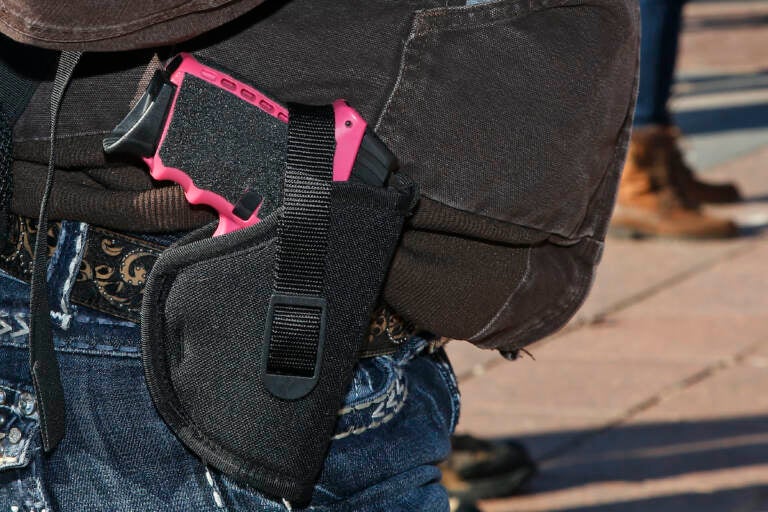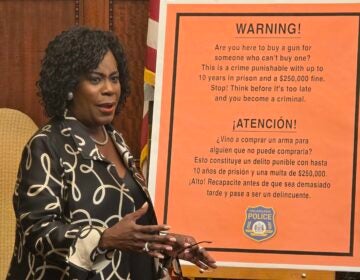Gun-carrying laws are becoming looser in the U.S.; researchers and advocates say it’s a dangerous change
An increase in concealed carry permits is leading to an increase in total homicides, according to a new study from Rutgers University Camden.

File photo: Gun advocates attend a rally. (AP Photo/Sue Ogrocki)
Karise Allen-Krew started carrying a handgun in 2018, right after she was robbed by two unarmed individuals who were helping her jump her vehicle just outside Philadelphia.
“My husband said ‘you’re going to carry every day,’” she said.
And she does. Allen-Krew says it makes her feel safer on the city streets, where homicides have risen dramatically since 2019.
“You can carry around your waist, your thigh holster, ankle holsters, we have bra holsters now. We’re lucky, we have multiple ways to carry.”
Allen-Krew founded That Gun Talk, a Philadelphia firearm safety and training organization affiliated with the National African American Gun Association. She says their concealed carry course has seen an uptick in signups, and Black women are the largest-growing group of new enrollees.
Many Philadelphians armed themselves during the pandemic. The total number of carrying permits issued by the Philadelphia Police Department more than tripled between 2019 and 2022, from roughly 9,000 to more than 33,000, according to City of Philadelphia data.
That trend may be part of what’s keeping the homicide totals at a high, said Ian Silver, co-author of a recent study in the Journal of Urban Health.
“To our surprise, the number of gun homicides did not actually increase the number of concealed carry weapon licenses issued, and the number of licenses issued did increase the number of gun homicides,” Silver said.
Silver collaborated with two researchers from Rutgers University Camden to track concealed carry permits issued in 11 states between 2010 and 2019. He said that long term trends illustrate that an increase in the number of granted permits was consistently followed by increased homicide numbers, and not the other way around.
“There seems to be a relationship even after accounting for the fact that gun homicides in one year might affect concealed carry weapon licenses in the next year,” he said.
Silver’s team is not the first to draw this conclusion. At least three well regarded studies found that access to concealed carry permits may increase firearm homicides. That’s according to a review from the Rand Corporation. Another study from Johns Hopkins University found that states weakening their permit requirements led to a 24% increase in firearm assaults.
It’s not surprising that looser carrying laws would lead to more harm, said Lisa Winkler with the South Jersey chapter of gun safety group Moms Demand Action.
“We humans, we’re really not set up emotionally to carry around such a deadly weapon all the time,” she said. “We have egos, and many times the anger causes an irrevocable deadly decision.”
Gun rights advocates say there are ways to preserve the rights to bear arms and also minimize deaths and injuries. Randy Robinson, policy director of That Gun Talk, said it all comes down to training.
“You essentially have people who never concealed carry, they did not own a firearm, who now are now taking on the greatest responsibility as a firearm owner, which is to carry in public,” he said. “It is to our absolute detrimental effect that we don’t take the steps to educate and prepare them for that.”
A changing landscape
As anyone over 21 can apply for a concealed carry permit, Pennsylvania is a “shall-issue” state. State law requires residents have a concealed carry permit to keep a firearm hidden on their person or stored in their car. Permits are not required to carry a firearm openly in Pennsylvania- Philadelphia stands as the lone exception.
More than half of U.S. states don’t require a permit for concealed carry — up from just four states a decade ago, according to an analysis from The Trace.
Until recently, seven states were “may-issue” states, which meant permits were only granted to people who had a special need to carry a gun, such as a dangerous job.
Last fall, the U.S. Supreme Court ruled in New York State Rifle & Pistol Association, Inc. v. Bruen that “may-issue” states are in violation of the second amendment and must become “shall-issue” states.
Those states must become “shall-issue” now, said Andrew Willinger, executive director of the Duke Center for Firearms Law. Some of them, including New York, New Jersey, Maryland and California, are trying to make it more difficult to get a concealed carry permit while still complying with the court ruling.
For example, New York lawmakers passed the Concealed Carry Improvement Act eight days after the Supreme Court decision. It strengthens the permit application process and bans the carrying of weapons in churches and parks. But it is facing legal challenges from gun rights advocates, including pastors.
Willinger says the Supreme Court ruling may fuel expanded carrying access in the future.
“You could maybe say that if in 10 years there are 40-plus states that have permitless carry, the court will again say ‘this group of outlier states will have to change its laws,’” he said.
Robinson, of That Gun Talk, said he supports the Supreme Court decision. He wants legal gun owners, and especially legal gun owners who are Black, to be able to carry and also get involved in the business and culture of guns.
“All you hear about is criminal us — we don’t talk about our use recreationally, or our input in the industry,” he said. “We’ve been politically exiled from that economy.”
Republican senators introduced a bill to make Pennsylvania permitless in 2021, but then-Gov. Tom Wolf vetoed it. He said in his veto message that it would “exacerbate gun violence and jeopardize the safety of all Pennsylvanians.” He also noted that removing the permitting process which includes a background check, would lead to “domestic abusers and other dangerous criminals” carrying weapons.
If you or someone you know has been affected by gun violence in Philadelphia, you can find grief support and resources online.
WHYY is your source for fact-based, in-depth journalism and information. As a nonprofit organization, we rely on financial support from readers like you. Please give today.







